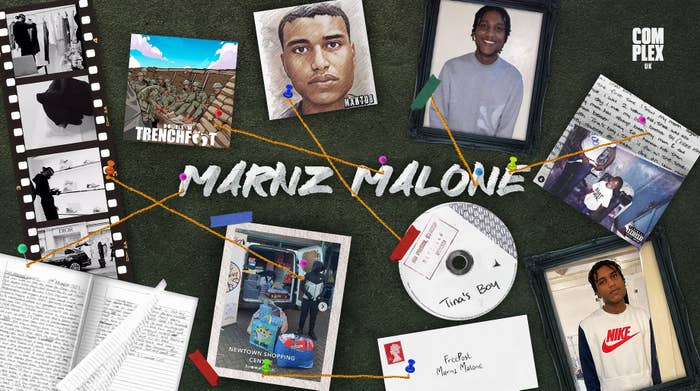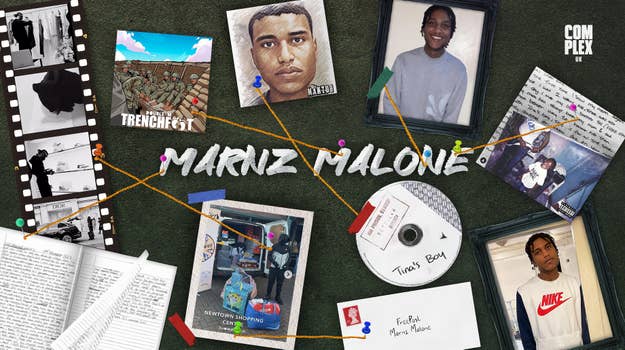
Marnz Malone has undergone a remarkable transformation. From uncertain driller to ‘real rap’ star, he’s finally grounded in his one true calling. In a revealing conversation from behind bars, the Jamaican-born, Birmingham-raised rapper sheds light on his journey of self-discovery and artistic growth.
Previously going under the moniker Double M, Marnz Malone—who is currently serving 11 years on firearm charges—changed his name as a symbol of personal evolution, and was given a further nudge by EGA President Colin Batsa. “Double M is just an abbreviation of Marnz Malone, so it’s not like I’m a different person,” says Marnz. “But I feel like Double M was when I wasn’t sure of what I wanted to do: if I wanted to be a drill artist, a ‘real rap’ artist, or if I was going to do both. I wasn’t quite sure. But when Colin said to me, ‘It’s time to drop Double M; Marnz Malone is more grown and sexy,’ I fully agreed with him. It’s basically to show the growth in me as an artist.”
Today, Marnz embodies maturity and confidence, signifying a newfound clarity of purpose. His jail freestyles have shaped his storytelling ability and deepened his connection with his audience over the years. Drawing inspiration from his struggles and experiences, he infuses authenticity and raw emotion into his raps, resonating with listeners on a profound level. And he’s been co-signed by some of the country’s biggest musicians along the way too: Central Cee, Stormzy and Potter Payper are just a few of the acts who have shown his music support, from the gritty jail freestyles through to the future-classic mixtapes.
The 22-year-old’s latest, Tina’s Boy, holds deep personal significance as a tribute to his mother. Throughout the mixtape, Marnz shares intimate details of his upbringing and the challenges his mother faced as a single parent, while paying homage to his roots and honouring the sacrifices his mother made for him. From 2022’s Trenchfoot to 2023’s Maktub to Tina’s Boy, Marnz reveals his growth as an artist and his evolving approach to music. Each project represents a unique chapter in Kimani Shaw’s life, with Trenchfoot serving as an experimental phase and Maktub marking a pivotal moment of realisation and self-discovery.
As he continues to make strides in his career, Marnz Malone remains grounded and focused on his ultimate goal: to leave behind a lasting legacy as a force to be reckoned with in the British rap scene, aspiring to inspire others and create a meaningful impact that transcends generations. We hopped on the phone to talk about all the buzz currently surrounding him, an emotional moment watching Stormzy at Glastonbury, and what it’s like to be a signed artist behind prison walls.
“Giggs didn’t need to speak on the intro of ‘2AM In Manchester’, Cench didn’t need to do any of the things he was doing for me, Potter didn’t need to do that verse on ‘Went To War’, but it was overwhelming at one point because these people know who I am now, and they genuinely wanna see me win.”
View this video on YouTube
COMPLEX: Mr. Malone! How are you? Good to talk with you today, despite the circumstances. Firstly, let me say a massive congratulations for all you’ve achieved so far while you’ve been behind bars: you’ve captivated the entire scene with your music and you recently signed with EGA, which is now home to some of the country’s biggest-selling rappers. You’ve also garnered support from notable figures in the industry, such as Potter Payper, Central Cee and Stormzy. How have you found this whirlwind of hype and success?
Marnz Malone: Yo, Mimi! Yeah, man, good to talk to you as well. I definitely feel the support from everyone, even the people that came before me are showing me love and I feel super honoured. I’m a big fan of music, so to know that the people running the industry support me doesn’t go unnoticed. I never really had anything growing up so to have all this, I appreciate it more than the average person. For example, Giggs didn’t need to speak on the intro of my song [“2AM In Manchester”], Cench didn’t need to do any of the things he was doing for me, Potter didn’t need to do that verse [on “Went To War”], but it was overwhelming at one point because it’s like: all these people know who I am now, and they genuinely wanna see me win. I’ve got a memory of Stormzy: when he did Glastonbury, I watched it from my jail cell and saw him shouting people out and I just thought to myself, “Rah! Look at how far he’s come.” I got quite emotional watching that, like: “I could be doing that, but instead I’m in here fighting my case.” And now I’ve got Stormzy following me and listening to my music! It’s very surreal.
Signing with EGA is a significant milestone in your career. What led you to choose them as your label, and how has the experience been so far?
The first person to speak to me about deals was [Michael] Adex—Aitch’s manager—then there was a bidding war whilst I was sitting in my cell. As I learned more, I realised that education about the music game and deals are important. At the time, when they were offering me deals, I didn’t know anything; then what ended up happening is people kept mentioning Colin [Batsa, CEO of EGA] to me, and when he finally got a message to me, he said: “When you’re ready to talk, we’ll talk.” He just said all the right stuff in regards to the deal. As much as the deal was good, it was more so about how the label made me feel; I felt like I was part of a family and I wanted to make sure, firstly, that they understood who I was as an artist. It takes a special team to deal with someone like me, and they over-delivered. I feel like I’ve got the best team.
Central Cee’s manager, Bello, visited you in jail, right? He’s constantly showing you love on his socials, which I think is amazing considering all the eyes that are on him and his circle at the moment. How has it been to have that support from such a respected name in the game?
He liked my Instagram post that I did for “Cold Hearted World”, then I shouted him back and told him, “I’m all ears,” but I don’t think he got my drift [laughs]. He said he wanted to come to see me and, long story short, he did. Bello knows what he’s talking about and he knows what he’s doing. I feel like he’s a bit misunderstood, though. I feel like people mistake his confidence for cockiness, but he’s a very smart guy when it comes to this music thing.
You went from drill frontrunner to ‘real rap’ star Marnz Malone over the course of a couple of iconic jail freestyles. What prompted that shift?
Double M is just an abbreviation of Marnz Malone, so it’s not like I’m a different person. “But I feel like Double M was when I wasn’t sure of what I wanted to do: if I wanted to be a drill artist, a ‘real rap’ artist, or if I was going to do both. I wasn’t quite sure. But when Colin said to me, “It’s time to drop Double M; Marnz Malone is more grown and sexy,” I fully agreed with him. It’s basically to show the growth in me as an artist.
Let’s talk about Tina’s Boy—your brilliant, most recent project. What was the inspiration behind the title and the themes explored on the mixtape?
My mum’s name is Tina, and it’s dedicated to her. I just wanted to give her the flowers she deserves. I feel like I should’ve touched more on my mum’s story on the tape. My mum’s from Jamaica, and so am I. When my dad died, I was two years old, so to get by, my mum sold clothes in Jamaica to afford a ticket to London and she sent for me when I was 6 years old. That name, ‘Tina’s Boy’, means so much to me because people used to see me and recognise me as that, and it’s a name that just stuck with me—it’s a way of honouring that. Before Tina’s Boy, though, I was gonna call it The Golden Child because that’s the title my friends gave me. All my family that live in Jamaica have me down as the Golden Child, but what I didn’t like about that is that I’ve got three other siblings, so I didn’t want them to feel like I’m the superior child. So even on the project, I make sure that they’re honoured too.
How would you compare Tina’s Boy to your previous projects, 2023’s Maktub and 2022’s Trenchfoot?
When I made Trenchfoot, I never even thought about making a project. I didn’t even know if this was going to work in the long-run. I shared a cell with KB and he explained what he was doing and I just picked up on the process. But all my tapes are a moment in time for me. With Trenchfoot, I was experimenting, but it’s one of my sayings; to have a ‘trench foot’, it’s a condition that the soldiers developed over time from wars so it was a metaphor for me as I’d been in the trenches for a while. One of my rapper bredrins told me: “Don’t overdo it. Just do it as an EP.” That’s why I did the 7 tracks and 3 bonuses. The tune with Loski was the biggest track but I didn’t want to be the rapper associated with just one track alone.
For my second project, Maktub, I used Trenchfoot to see what I should’ve tried more of and what went well. Around the time I was working on Maktub, I got caught with contraband and I had to go down to the segregation unit—I was down there for weeks! Before I left, I read The Alchemist and there’s a word in the book called ‘Maktub’ and that’s where I got the word from. When I read the book and understood what the term meant—‘it is written’ in Arabic—it became a saying for me and it was the perfect name for the project like it was God’s plan. It felt like Maktub wrote itself because The Alchemist did help me change my mindset and, in all honesty, with rap, it was more like a pastime for me and it wasn’t something I took too seriously. I kept getting asked, “How are you gonna top Maktub?” But I knew I had it in me to do just that.
With Tina’s Boy, because the name was so important to me, I had to make sure the content matched it. I mention my mum in every song and it might not all be in the best light, but I do. I wanted to prove to anyone who doubted me that I could do it.
“Without trying to offend anybody, when I look at the game right now and some of the people in it, I don’t think I’ll be seeing most of them in ten years’ time, but I know I’ll still be around then.”
View this video on YouTube
Your videos for “Cold Hearted World 2” and “Ball 4 U” have received so much positive feedback. In your current situation, how do you approach directing visual storytelling in your music videos?
Every little detail goes through me. The ideas for the videos and directing, it’s all me. This is why I love my team because once I give them an idea, we make it happen and that’s all I wanted from this game. As an artist, I just want to be able to focus on my music, and I feel like where a lot of artists go wrong is they have so much going on at once that they can’t actually focus.
Who are some of the artists you’ve looked up to as you’ve gone on your musical journey?
That’s a really good question. The first person that comes to mind is Nines. He’s the punchline king so, when I make my music, I try to say something meaningful and add that to my music. Apart from that, I wouldn’t say I take much UK influence—my favourite rapper is actually Lil Durk. He’s inspirational to me, and with Nines, a lot of the things he’s doing on a mogul level—which took him years, blood, sweat and tears, to get to—inspires me a lot.
How do you feel about the music scene in Birmingham?
I feel like Mist made history by going No. 1, which is big for the city, and he had my favourite rappers mentioning his name in songs so I’d say he’s a Brum legend. I like Stardom, I like KB, then you’ve got RM and my little batch. But I still think Brum is overly slept-on. Oh yeah, shout out Miss LaFamilia too!
What advice would you give to aspiring artists who come up against challenges in trying to break into the music industry?
Whatever’s for you will be for you. Anyone who’s thinking of making music or doubting yourself, everything could change for you overnight—let alone in a year. My girl said the best thing to me the other day: she said, “Anything you want, give it a year and if you still want it after a year, then it’s still worth having.” Look how my life’s changed so dramatically in a year! It’s because I wanted it, so I went after it. Timing is important, too, though—don’t sleep on timing. I never imagined this for myself, let alone other people, so don’t give up on your dreams.
I love that! What message do you hope to convey through your music, and what legacy do you hope to leave behind as an artist?
Without trying to offend anybody, when I look at the game right now and some of the people in it, I don’t think I’ll be seeing most of them in ten years’ time, but I know I’ll still be around then. On Maktub’s first track, Cold Hearted World, in the second line I say: “Fuck who did it first/It’s about endurance.” What I meant is, I don’t care who did it before me, or who might come and do it after me—it doesn’t even matter! It’s about the future and I believe that I am one of the future ones. I feel like most people don’t really make meaningful music nowadays. I’m a fan of my music; I feel like I make meaningful music and you can listen to any of my tapes years from now and it’ll still be meaningful. I’m definitely a force to be reckoned with.



